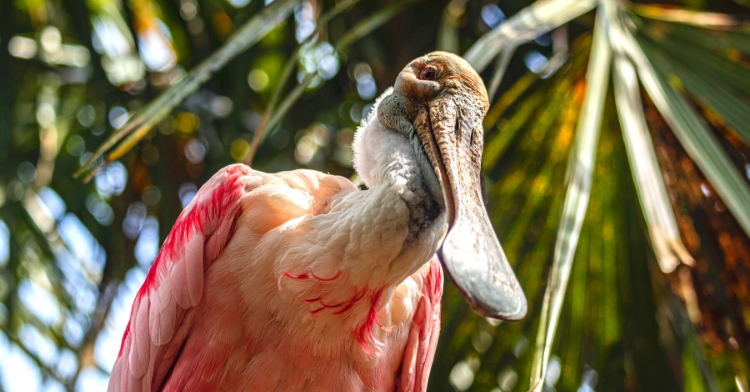In 1845, Florida officially became a U.S. state. That same year, almost 200 years ago, was also the last confirmed sighting of a roseate spoonbill in Wisconsin… until now.
The birdwatching community in Green Bay, Wisconsin is buzzing with excitement at the appearance of this rare and stunning visitor. This sighting marks the first time in 178 years that anyone has reported a glimpse of this species in the state.
Birders and nature enthusiasts have been flocking to the region, eager to catch a glimpse of this unique and captivating bird.
Roseate spoonbills have long legs, a wide, flat beak and distinctive pink coloring. You typically find these birds in the warmer climates of the southern United States, as well as parts of Central and South America.
It is highly unusual for a roseate spoonbill to venture so far north, making its appearance in Wisconsin all the more remarkable.
According to Jeff Bollier of the Green Bay Press-Gazette, historical records indicate the last confirmed sighting of this species in that area was a deceased roseate spoonbill found in Rock County, Wisconsin in 1845.
That makes this recent sighting the first time anyone has observed a living spoonbill in the state. The bird has been frequenting the Ken Euers Nature Area and the Cat Island restoration area, alongside other water birds.
While it remains unclear how and why this particular spoonbill ended up in Wisconsin, it is not uncommon for birds to be pushed off course by stormy weather or to seek new habitats due to food competition.
Interestingly, this rare sighting in Green Bay is not an isolated event. Roseate spoonbills have steadily expanded their range northward in recent years.
Two roseate spoonbills have also been recently spotted in Washington, D.C., specifically in the marshes of Kenilworth Park & Aquatic Gardens. The presence of these spoonbills in the nation’s capital suggests that unusual weather conditions such as wind and rain, or competition for food may have driven them farther north than their usual habitats.
The sighting of a spoonbill in Green Bay is not only a significant event for birdwatchers but also a testament to the resilience and adaptability of these remarkable creatures.
Despite their preference for warmer climates, spoonbills have demonstrated their ability to explore new territories and adapt to different environments. While the exact reasons behind their recent ventures into northern regions remain a subject of speculation, the presence of these birds serves as a reminder of the interconnectedness of ecosystems and the ever-changing dynamics of the natural world.
You can find the source of this story’s featured image here.
Want to be happier in just 5 minutes a day? Sign up for Morning Smile and join over 455,000+ people who start each day with good news.



